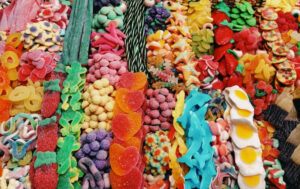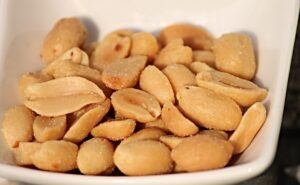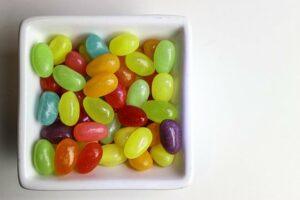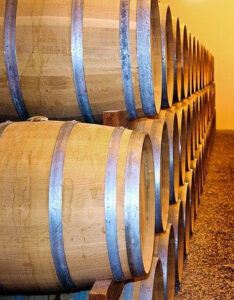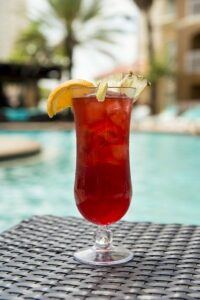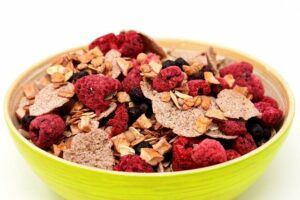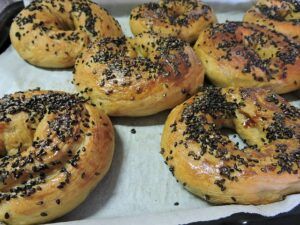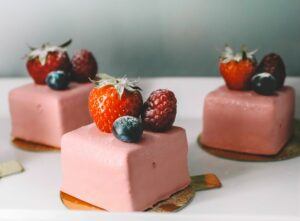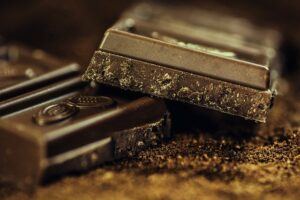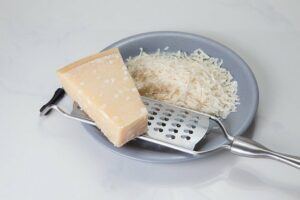Animals- their body parts and secretions, are utilised so much in every industry that it’s no surprise that they turn up in almost everything you can think of. With unthinkable millions of animals being slaughtered every single day, it’s big business.
However, sometimes the most unusual animal products turn up in foods you never imagined.
Here are some of the most common non-vegan ingredients that could show up in your food.
Sweets / Candies / Sherbet/ Marshmallows / Pick N’ Mix / Mousse / Desserts – Gelatine (or gelatin)
Gelatine is a common ingredient that can easily catch new vegans out. It is made from the crushed and boiled bones of slaughtered animals. You’ll find gelatine in most chewy sweets, marshmallows, sherbet, as these types of sweets are primarily gelatine, heavily sugared to taste sweet and full of food colourings. It’s also the basic composition of any common sweets similar to these, like the loose ones such as ‘Pick ‘N Mix’. Parma Violets, and chewy textures such as those found in Wagon Wheels and mousse, and it’s even common in yoghurts to provide extra texture – so could show up in some non-dairy yoghurts.
Roasted Peanuts – Gelatine
Some varieties of roasted peanuts contain gelatine. Yep, it turns up in a lot of unexpected places! In roasted peanuts, it’s used to help the salt or spices stick to the peanuts better. Always check the packet to avoid being caught out.
Thai Curry Pastes / Worcester Sauce / Salad dressings and some places you definitely wouldn’t expect! – Anchovies.
These tiny fish are used in a lot of different cuisines, but are particularly popular with South East Asian dishes. For this reason they are often found in a lot of Thai curry pastes and what may otherwise be vegetable dishes. They’re also the primary ingredient of Worcestershire Sauce, (as it’s based on an umami flavouring) – though vegan varieties do exist. Anchovies can also be an ingredient in some salad dressings, and they have even been found in what appeared to be a vegetable quinoa dish from Aldi.
Confectioners’ Glaze on Sweets and Desserts/ Glazing Agents on Chocolate and Fruit – Shellac (E904)
Shellac (or lac resin) is the most popular glazing agent, and it comes from the lac bug, which lives on trees in countries like India and Thailand. The female bugs secrete this waxy substance to cover themselves and their developing larvae, like a protective shell. Shellac is a key ingredient in Confectioners’ Glaze, and unfortunately many millions or lac bugs and their larvae are swept up and harvested along with the shellac when it’s collected.
You will often find shellac on cheap fruit and veg, to give it a shiny texture, dried fruits like bananas, candies, and used as a glaze on some chocolates.
Another ingredient you may well find on seemingly vegan fruits, certain non-dairy chocolates and snacks such as banana chips is Beeswax (E901), where it’s used glazing agent, or to prevent water loss from fruits.
Beers and Wines – Isinglass.
Isinglass is very similar to gelatine, and is essentially dried fish swim bladder, primarily from the Sturgeon. It is commonly used in the brewing process, particularly in the British brewing industry, as part of the filtration process, because it helps to clarify the final product. This means that a great deal of beers, ales, lagers and wines are not vegan friendly.
Isinglass is not the only concern however…
Within the huge range of alcoholic beverages available, many different animal products are common;
Blood and bone marrow, casein, fish oil, gelatine, chitin (crustacean shells), and egg albumin are all commonly used in the production of beers and wines.
So does this mean that as a vegan you can never drink again? Absolutely not!!
Whilst all of these animal products are rife, there are also many, many alcholic drinks of all kinds, including beers and wines, that are 100% vegan. This is increasingly the case as many companies have either switched to labelling their products as such, if they happened to be vegan friendly already, and others have altered their processes in the face of growing consumer demand.
Barnivore.com is a fantastic website and app, that you can use to discover in seconds whether that drink you’re eyeing up in the pub, bar, work-do, or wherever, is vegan friendly or not. They work tirelessly contacting manufacturers for full traceability of their alcoholic drinks, and the site will happily inform you of more than 300 brands and drinks that you can swig and be merry. Just don’t drink too much…
E Numbers – E120, E322, E422, E 471, E542, E631, E901 and E904.
There are several E numbers that you will see listed on all kinds of seemingly-vegan-friendly foods, but that E number changes everything. There are many more E numbers that could either be plant or animal derived.
For more information, check out our article on ‘E numbers to avoid’ here.
Red or pink coloured foods, drinks, candies – Carmine/Carminic acid /E120/ Natural Red No.4 / ‘Crimson lake’
Made from the crushed cochineal insect, this ‘natural’ dye has been used for thousands of years, first being used by the Incas of Peru. It is the most commonly used red food colouring. It literally turns up in almost everything that has any kind of red colouring, e.g. fruit drinks, soft drinks, red candies, yoghurts, fruit pies, biscuits, jams, alcoholic drinks, doughnuts with glazing, cakes, etc, etc. Its’ also used to produce other colours, such as pinks, purples and oranges. So do beware. There are a growing number of non-carmine red colurings being used in the food industry, but crushed bugs remain the most abundant, so the best way to be sure is to look for certified vegan products.
Fortified breakfast cereals / Orange Juice and other ‘healthy’ fruit juice – Vitamin D3 / Calciferol
There are actually two types of ‘Vitamin D’ – which are D2 and D3. Knowing the difference between the two is important if you wish to avoid the animal sources. Vitamin D3 is the one our bodies make when exposed to sunlight. Vitamin D3 when found in foodstuffs is primarily from animal sources such as fish oil, liver and egg yolks, and is also commonly derived from sheep wool.
You will find D3 in fortified breakfast cereals, orange juices, some yoghurts, (but not certified vegan ones, which will obviously not contain cows milk and if fortified, will contain Vitamin D2, – which is made by plants).
Vitamin D2 is the most common vegan version, and it’s made by lichen. There is a vegan D3 now, also from lichen. Again, always check the label to see if the product is labelled as suitable for vegans. If not, then you can assume the Vitamin D is animal-sourced.
Paste / Gnocchi / Noodles – Albumin (egg whites)
It’s not a case of simple avoid ‘Egg Noodles’ or ‘Egg Pasta’. Some varieties of pasta and noodles that are not advertised as being centred around egg a principal ingredient, especially fresh ones, – but also store-bought, – contain eggs or egg albumin. Just check the ingredients.
Bread, Bagels, Pizza Bases – L-Cysteine (E920)
L-Cysteine is one of the amino acids that form proteins in the body. In the food industry, it’s used to preserve shelf life, and to condition the dough, helping it to stay spongy. (It’s not found in flour – so even store-bought fresh baked bread is usually free of it. It’s worth checking the other ingredients however, as there could be milk derivatives or animal fats in some varieties.
As one of the building blocks of keratin, it’s no surprise that cysteine is found in feathers and hair. So guess where it’s sourced from? That’s right, – duck and poultry feathers, sometimes cow horn. There’s an unlimited supply of these, ‘thanks’ to the slaughterhouses of course.
Now, humans are animals too, and popular British Broadsheet ‘The Guardian’ suggests another reason that not only you, but your non-vegan family might also want to steer clear of this one, – because they say the majority of L-Cysteine is sourced from human hair…
French Fries – Animal Fat
Some brands of French fries are fried in animal fat. Many processed, frozen oven chips are also coated in some kind of animal fat, to help them crisp up in the oven. The best way to be sure you’re getting a vegan product is t choose one that is labelled as such.
Refried Beans – Animal Fat
Traditionally, the Mexican favourite of refried beans are choc-full of lard, which is basically animal fat. In the food industry, it comes from rendering the fat tissue of pigs.
But don’t despair! As with EVERYTHING on this list – animal-free, vegan varieties are easy enough to come by, so you don’t have to go without!
Vanilla, Raspberry and Strawberry flavoured products – Castoreum/’Natural’ Vanilla / ‘Natural Flavourings’
This is vanilla flavouring that comes from the castor sac of the beaver. You might expect to find it in anything that’s vanilla flavoured, such as ice-cream, biscuits and cakes. However, it’s most likely to be found in very expensive perfume these days, as it’s a much rarer ingredient and not produced in very large quantities anymore. You can learn more about vanilla here.
Sugar – Bone Char / ‘Natural Carbon’ in the USA
‘Natural carbon’ – that’s a rather sneaky name isn’t it?! Sugar in the USA is filtered through ground bones to take out the ‘impurities’ and leave it sparkling white. Sugars that have not undergone this clarifying process are available. We should point out that this is not a problem in the UK, as no sugar produced in the UK is filtered through bone char.
And what about dairy?
Various derivatives of dairy are used in all kinds of food, but there are some places you can really forgive yourself for not expecting it:
Hidden Dairy:
Dark Chocolate or Cocoa Solids – Milk Derivatives
Just because it’s not ‘milk chocolate’ doesn’t mean it doesn’t contain cows’ milk. Whilst it’s certainly the case that bars with at least 70% cocoa tend to be free of dairy, some brands do include derivatives of dairy such as ‘milk solids‘, milk fat, full fat or skimmed ‘milk powder’, whey powder, casein and lactose (milk sugar).
It’s also possible that it contains honey or is glazed with beeswax.
Boxed cereals/ Health Food, Protein, Energy and Nutrition Bars / Pre-prepared breadcrumbs/ Crackers – Whey Powder, Honey, Milk Derivatives
Many popular brands of boxed cereals can easily appear to be animal-free. However, it’s common for the fortified ones to contain animal-derived Vitamin D3. Depending on the type of cereal, they may also have whey solids, honey, lactose (milk sugar), or other derivatives.
Non-dairy cheeses – Casein, Whey Powder/Whey Solids / Whey Isolate, Beeswax
Yes! We know, right?!
Surprising as it is, not all non-dairy cheeses, such as those made from soy, nuts or rice, are actually truly dairy-free or vegan. A lot of them, especially artisan non-dairy cheeses, contain derivatives of dairy, such as casein or whey proteins. Some cheeses are brushed with beeswax to seal and preserve them.
The way to be sure of course, is to go with trusted vegan cheese brands, such as Tofutti, Violife, Follow Your Heart, VeganRella, and many more.
(In the Veganeur directory, you can find all you need to know to ensure you have easy access to a huge range of vegan cheeses).
Non-dairy creamers
Just as with the non-dairy cheese, ‘non-dairy’ does not always mean 100% dairy-free. Once again, in many non-dairy creamers, milk products can be lurking. This goes for non-dairy ice cream too. Always choose a vegan-labelled variety, as by law these cannot contain any animal-sourced ingredients.
Bear in mind that some non-dairy yoghurts may also contain Casein, Whey solids or even gelatine.



